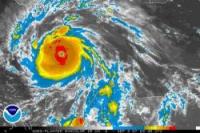Chris Mooney’s weekly DeSmogBlog dispatch.
The Danish environmental apostate Bjorn Lomborg is at it again.
Lomborg has a new book out, and just like his last one (The Skeptical Environmentalist), it’s drawing strong criticism. Lomborg’s argument isn’t that global warming is a hoax–thank goodness, we’re mostly past that. Instead, he merely argues that climate change is not as big a deal as some think (e.g., Al Gore)–and further, that it doesn’t make good economic sense to take dramatic steps to address the problem by imposing mandatory emissions caps.
Because I know something about the subject–and because of the recent records set by Category 5 Hurricanes Dean and Felix–I decided to have a look at how Lomborg applies this argument to the issue of hurricanes and global warming in particular (p. 72-81 of his new book). What I found is pretty consistent with what critics say about his treatment of other matters. Lomborg seems to ignore worst-case scenarios and precautionary thinking. Although he spends much time discussing how societal changes–the moving of persons and property into harm’s way–make us increasingly vulnerable to hurricanes, he fails to seriously consider the idea that when you add global warming to said societal changes, the result could be a double whammy.
Lomborg starts off his treatment of the hurricane-climate issue by showing how some environmentalists have over-hyped the science, either by directly linking climate change to individual events like Hurricane Katrina or by ascribing too much certainty to conclusions that are still the subject of considerable expert debate. Here, the “skeptical environmentalist” does indeed score some easy points: Greens should have been much more cautious on this subject in the wake of Katrina. Lomborg is also right to note that even if we’re worried about worsening hurricanes due to global warming, it doesn’t necessarily follow that our most immediate policy solution should simply be to cut greenhouse gas emissions. We are committed to significant warming no matter what happens, and if this warming is going to spark stronger or more destructive hurricanes on average, the most immediate policy prescription ought instead to be investing in better hurricane preparedness (although of course there are many other valid reasons to cap emissions).
But from here, Lomborg grows increasingly misleading. Before long, we find him citing a late 2006 statement from the World Meteorological Organization as representative of the current scientific consensus on the relationship between hurricanes and global warming. There’s nothing wrong with the statement itself, but Lomborg reduces its ten points down to only three–all of which cut in Lomborg’s ideological favor–while failing to share the rest of what we know with his readers. In fact, read in full, the statement outlines a number of ways global warming should worsen hurricane impacts that are a matter of consensus (to say nothing of potentially larger magnitude changes that are still debated but that may well be happening). Consider these two “consensus” points that Lomborg completely omits: “It is likely that some increase in tropical cyclone peak wind-speed and rainfall will occur if the climate continues to warm. Model studies and theory project a 3-5% increase in wind-speed per degree Celsius increase of tropical sea surface temperatures”; and “If the projected rise in sea level due to global warming occurs, then the vulnerability to tropical cyclone storm surge flooding would increase.”
Having downplayed some of the more troubling elements of the scientific consensus–and simply dismissed the possibility of more dramatic changes that are currently being debated–Lomborg then seizes on one item in the WMO statement in particular–“The recent increase in societal impact from tropical cyclones has been largely caused by rising concentrations of population and infrastructure in coastal regions”–and runs with it. It is indeed an accepted position among hurricane specialists that the spike in recent storm damage is largely the result of having more people and property in harm’s way. But from here Lomborg leaps to the totally incorrect conclusion that changes to hurricanes themselves as a result of global warming are a concern that can be minimized. As he writes: “If we care about helping potential victims of future Katrinas and Andrews, it appears unquestionable to suggest that we should focus on societal factors first.”
Alas, it’s not an “either-or,” it’s a “both-and.” Due to our staggering vulnerability–in the U.S., for example, something like 50 percent of the public lives within 50 miles of a coastline–we should clearly be taking commonsense protective measures against hurricanes. Lomborg lists many of those: improving building codes, establishing better protective infrastructure, restoring wetlands, investing in better forecasts, warnings, and evacuations, and so on. All are great ideas. But what about the fact that hurricanes are expected to be more intense on average, to rain more, and to coast atop higher oceans? And what about the fact that some scientists think they may be intensifying more rapidly than previously expected–that in fact, they may already have changed dramatically for the worse?
These kinds of changes–some a matter of consensus, some still being debated–would serve to amplify any pre-existing societal vulnerability. So if you ignore them and only focused on addressing that vulnerability, you’re only dealing with a part of the problem. Not only must we protect vulnerable places and people; we will probably have to protect them more and better than before. We have to think in terms of risk, not of certainty; and hurricane risks are probably rising as a result of climate change.
Alas, Lomborg essentially misses this more sophisticated point; he’s too busy being a polemicist. As a result, when it comes to hurricanes, he only tells the side of the story that will help him downplay the seriousness of global warming.
Subscribe to our newsletter
Stay up to date with DeSmog news and alerts







